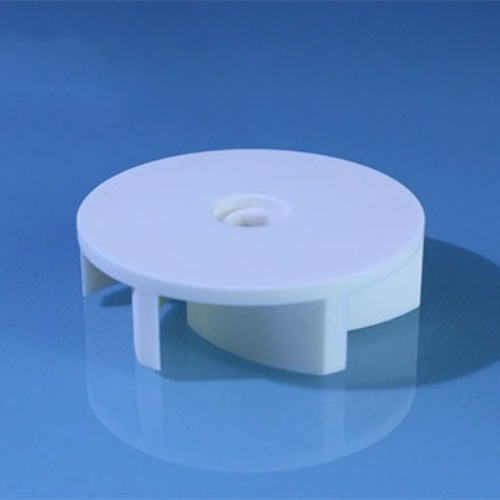Application of Aluminum Nitride Ceramics in Sensors
Aluminum nitride (AlN) ceramics, as a high-performance new material, have shown broad application prospects in the field of sensors due to their unique physical and chemical properties.

- High precision sensors
Aluminum nitride ceramics have characteristics such as high thermal conductivity, high insulation, and low dielectric constant, which can effectively conduct and disperse the heat generated during the operation of sensors, ensuring that sensors operate within the normal working temperature range, thereby improving the stability and reliability of sensors. Based on these characteristics, aluminum nitride ceramics can be used to manufacture high-precision temperature sensors, pressure sensors, gas sensors, etc. For example:
-Temperature sensor: The high thermal conductivity of aluminum nitride ceramic enables it to quickly respond to temperature changes, thereby achieving high-precision temperature measurement.
-Pressure sensor: Its high hardness and good mechanical properties enable it to withstand large pressures while maintaining high sensitivity.
-Gas sensor: Aluminum nitride ceramics have good adsorption and reaction capabilities for certain gases, which can be used for detecting and analyzing gas composition. - Miniature sensors
Aluminum nitride ceramics have excellent processing performance and dimensional stability, and can be used to produce miniaturized sensors. These miniature sensors have broad application space in fields such as smartphones, wearable devices, and the Internet of Things, enabling real-time monitoring and analysis of various physical and chemical parameters. - High temperature environment sensor
Aluminum nitride ceramics can maintain stable performance in extreme high temperature environments, with a working temperature range of up to 900 ℃ or even higher. This characteristic makes it an ideal material for sensors in high-temperature environments, such as in aerospace, energy, and petrochemicals, where it can be used to monitor high-temperature pipeline pressure, engine temperature, and more. - Piezoelectric sensors
Aluminum nitride ceramics have piezoelectric properties and can convert mechanical energy into electrical energy, or vice versa. Based on this characteristic, aluminum nitride ceramics can be used to manufacture piezoelectric sensors, such as MEMS sound pressure sensors and ultrasonic sensors. For example, aluminum nitride piezoelectric micro mechanical ultrasonic transducer (PMUT) performs well in low-frequency high-sensitivity acoustic detection. In addition, aluminum nitride ceramics can also be used to manufacture high-frequency high-power devices, such as high-power electronic devices and high-density solid-state memory. - Multi functional sensors
By integrating multiple functional units on an aluminum nitride ceramic substrate, the production of multifunctional sensors can be achieved. These sensors can simultaneously monitor multiple parameters such as temperature, pressure, humidity, and gas concentration, providing more comprehensive and accurate monitoring data for fields such as smart manufacturing and smart homes. - Optical sensors
Aluminum nitride ceramics exhibit certain optical transparency in the ultraviolet and visible light ranges, particularly in the field of deep ultraviolet optoelectronic devices. Therefore, aluminum nitride ceramics can be used to manufacture optical sensors such as ultraviolet sensors and infrared sensors, which have important applications in environmental monitoring, medical diagnosis, and other fields. - Automotive electronic sensors
In the field of automotive electronics, aluminum nitride ceramic substrates can be used to manufacture high-performance sensor circuit boards. Its high thermal conductivity and good electrical insulation performance can ensure stable operation of the sensor in high temperature, high vibration, and corrosive environments. For example, aluminum nitride ceramic circuit boards can be used for ToF sensors to achieve functions such as autonomous driving, collision avoidance, and automatic braking. - Chemical stability sensor
Aluminum nitride ceramics have good chemical stability and corrosion resistance, and can resist corrosion in harsh environments such as acid, alkali, and salt water. Therefore, aluminum nitride ceramic sensors have broad application prospects in the chemical industry and biomedical fields, such as for detecting chemical components in corrosive gases or liquids.

Aluminum nitride ceramics have become an important material in the field of sensors due to their high thermal conductivity, high insulation, high hardness, corrosion resistance, and good compatibility with silicon materials. Its applications in high-precision, miniaturization, high-temperature environments, piezoelectricity, multifunctionality, optics, and automotive electronic sensors demonstrate its enormous potential in modern technology.
PREVIOUS:What are the applications of aluminum nitride ceramics in medical electronic devices
NEXT:What are the applications of aluminum nitride ceramics in the field of automotive electronics
CATEGORIES
LATEST NEWS
- Zirconia Ceramic Rod Custom...
- High-temperature resistance...
- What is the wear resistance...
- What is the hardness of cer...
- Aluminum oxide ceramic cust...
- What are the main aspects o...
- What are the mechanical pro...
- Thermal properties of zirco...
- What properties should be c...
- What are the mechanical pro...
